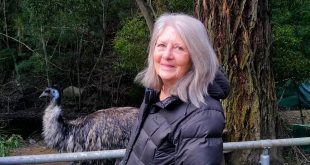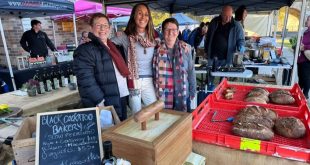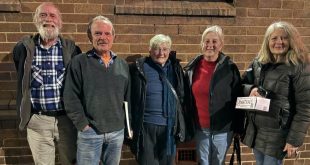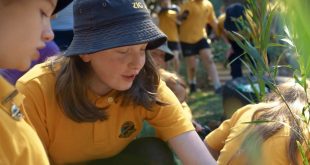
A chair on the Philosopher’s Walk looking through the Wolgan Valley. The chair was placed by Thomas Ebersoll in 2018. It, like Thomas, survived the fire, flood and landslips.
Story and photos by Tracie McMahon
The Wolgan Valley was labelled the “Forgotten Valley” by Greg Bearup in the Weekend Australian following the closure of Wolgan Gap Road. He posed the question “With the onset of more extreme weather, will some areas of the country simply become too expensive, or too dangerous, for human habitation?” Yet some people, like Thomas Ebersoll, owner of Newnes Hotel Holiday Cabins and Campground, remain resilient and ready to face this challenge.
Key Points:
- Newnes is located in a fragile environment, prone to high rainfall and natural disasters.
- Newnes Hotel Cabins and Campground have been constructed with an awareness of both the need to protect this fragile environment and the heightened risk of natural disaster.
- Risk-conscious design and maintenance has enabled the business to continue to operate despite challenging circumstances.
Visiting the town of Newnes in the Wolgan Valley is like stepping into a time machine. You can see and touch the remnants of the world before petrol, when shale oil was king; poke your head amongst a tumble of bricks that cooked the coking coal; and marvel at the engineering that blasted through a hillside for an impossible descent into the valley by nineteenth century steam locomotives.
The remnants of the thousand-strong population and the economic folly of trying to extract natural resources from such a volatile landscape are everywhere, preserved by their remoteness. By the 1930s, the Shale Works was closed, with much of the infrastructure moved to Glen Davis or sold. All that remained was the hotel and a few homes: housing only four families by 1940.

The brickwork of coke ovens now provides a home for coral ferns, grasses and insects
But Newnes was not forgotten. The surrounding river flats became a holiday retreat for those wanting a ‘getaway’ and the hotel became a kiosk supplying campers with ice creams and cool drinks. Its wide verandahs were a welcome respite from summer heat and driving rain until the deluge of 1986, when the Wolgan River swallowed the hotel’s lilting back verandah in one gulp.
The Wolgan valley is no stranger to flood and, since the Hotel’s construction in 1906, the river has changed course, moving thirty metres closer to the building. In the 1986 downfall, it seemed nature had won its battle over the industrialists, reclaiming the last functioning remnant of the shale town.
But the friends of Newnes were not willing to let it go and in 1987, 186 volunteers cut the hotel into pieces and moved it by hand over three days to its present location. Bit by bit the hotel was pieced together, a crane lifted the roof into place and the roofing iron was nailed back on.

The Friends of Newnes celebrating the relocation of the Newnes Hotel (Courtesy Thomas Ebersoll – Allan Watson collection)
The building was now safe, but much of its contents had disappeared or were damaged in the flood, and the hotel continued its demise. Camping fees and a weekend kiosk could not fund the repairs necessary. In 1996, the owner placed a piece of cardboard on a star picket: “For Sale – Enquire within”.
Thomas Ebersoll joins the story
In the 1990s Thomas was a frequent visitor to Newnes, getting away from the busyness of city life, and noticed the sign. He says, “I couldn’t stop thinking about it. Everyone said I was crazy, but I could see the potential, and I wanted to do it.” He and his wife Helen purchased the property.
And so it began. Thomas in a caravan with a generator, a head full of ideas, and a passion to create a space where people could “sit, chill out and be quiet”. Over the next fifteen years, Thomas has restored the hotel, built four self-contained cabins, an amenities block and sympathetic infrastructure.
He and his wife Helen, and daughter Marianna, explored the area as they worked, researching, learning and sharing their hospitality and knowledge with visitors.
The property has approval for five more cabins and a second shower and toilet block, but Thomas feels that what he has is enough. He scoffs when I ask how he feels about the risks of owning and running the business. He says, “I don’t own anything. What a stupid concept. It was here before me and will be after. If the river claims this place, I have to accept it. I just care for it now.”
Thomas takes me on a tour of the infrastructure and the cabins, explaining how he cares for the property:
Building for resilience
Power is supplied by an array of solar panels which can be tilted to ensure sunlight is captured all year round. The panels supply more electricity than is needed with surplus power harvested by a battery. A back-up generator is in place if the batteries fall below 80% charge. Gas bottles are brought in as needed for gas hot water and cooking appliances.
At peak occupancy the Newnes Campground and Cabins can house 23 in the cabins and a village of hundreds on the campground. Prior to the road closures the campground regularly had 200 visitors on both Easter and October long weekends. Campers at the nearby National Parks and Wildlife Service Little Capertee Creek Campground also often used the amenities.
Thomas says this peak period is the only time when the back-up generator has had to be relied upon. Outside these peaks he usually has power to supply the business’ needs for six months.

Solar Panels and a working vegetable garden provide sustenance and power
A wood-fired barbecue and campfire area is set between the cabins. Below the amenities block Thomas has built a wood-fired pizza oven and camp kitchen. The pizza oven is a particular favourite with groups of campers. He just needs 24 hours’ notice to fire it up and ensure it’s ready to go.
Sewage from the cabins and toilet blocks is treated via a series of ‘Wisconsin Mounds: a system of interlinked septic tanks and underground tunnels and filters. Thomas says, “The whole system is just like a living creature with micro-organisms, sun and minerals working together to clean our human and water wastes.” Only eco-friendly chemicals are used, and some simple tips are provided in each cabin, like wiping greasy dishes with paper towel, to ensure the system remains healthy.

The effluent disposal system ensures that waste is treated effectively and does not damage the environment.
The Hotel grounds have a productive garden with vegetables, fruit and poultry. Visitors are welcome to share the produce on an ‘as needs and always leave some for the next person’ basis. Water for the gardens is harvested from the cabin roofs and drinking water is supplied by a spring behind the Hotel grounds. Water for firefighting is sourced from the river, with a firefighting pump permanently in place.
The question of firefighting resources leads me to ask about Thomas’ experience in the Black Summer fires. The Wolgan Valley was surrounded by the Gospers Mountain fire and Thomas remained on site with two NPWS firefighters who found themselves unable to leave the valley.
Thomas Ebersoll explains the features of the property which reduce the bushfire risk. (Click to play; 2min 37sec)
The cabins feature Thomas’ craftsmanship as well as his desire to minimise waste and honour the materials he is working with. Even the smallest off-cut can be used with the edges of cornices and architraves fashioned into handles or small pieces of art depicting the surrounding landscape.

Inside a cabin, Thomas Ebersoll pointing out use of ‘waste’ construction materials.
The future of Newnes Hotel
Prior to the landslip that closed the Wolgan Valley Road, Thomas was in the process of preparing the business for sale. He says at 68 he was finding the work of maintaining and operating the business was just getting too much. But now?
Thomas is not one for resting. He says, “Change is inevitable, you have to accept it. There might be another fire, another flood. With less people coming, I can manage. It will be five to ten years before there is any road.”
He says it has given him time to work on other ideas he has wanted to pursue. He points to three turn of the century train carriages which he has been restoring as a dedication to Allan Watson, who operated the Newnes Hotel weekend kiosk from the 1950s, after spending much of his childhood holidays at Newnes. Allan had started the project but was unable to complete it before his death in 2017. Thomas has completed it. The carriages are lined up next to the hotel, with a framed photo of Allan displayed in front.
He is also designing a nine-metre octagonal pergola for the space behind the hotel. He hopes to create a beautiful quiet space for small events, artists, and environmental enthusiasts to gather.

Thomas Ebersoll’s next vision for Newnes – still planning for the future.
For now, Thomas is happy to maintain the extensive grounds and welcome guests to the cabins and campground under escort arrangements. The valley is recovering, and many of its occupants including the flora and fauna, are returning. This moment in time is just one in the Newnes story and an unforgettable opportunity to witness firsthand nature and people adapting and recovering to a changing landscape.
Visitors should check the National Parks and Wildlife Services Alerts page to ensure any planned activities are permitted and can be conducted safely. The area is still prone to instability and road access via the Donkey Steps is under regular maintenance.
Further Reading
Bearup, G. (November 4-5, 2023) Forgotten Valley, The Weekend Australian, p. 19.
Take Action:
- Consider whether your property is prepared for environmental risks, and how you can prepare at both the building and maintenance stage to minimise these risks.
- Visit Newnes and experience what it is like to live ‘off-grid’.
- To learn more about the history of Newnes or the Wolgan Valley visit the Lithgow Library and Learning Centre. The Local Studies collection is extensive and Library staff are happy to assist.
Share this article:
This story has been produced as part of a Bioregional Collaboration for Planetary Health and is supported by the Disaster Risk Reduction Fund (DRRF). The DRRF is jointly funded by the Australian and New South Wales governments.
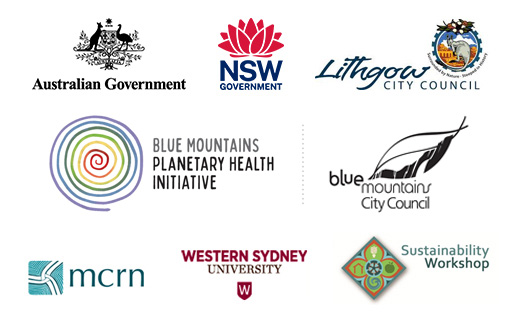
News From Around The Region
As 190 countries gather for the @cop16colombia UN Biodiversity Summit, to focus on how we can protect the world’s flora and fauna, we’d like to thank all those local individuals and organisations dedicated to the same goal who came together for World Animal Day at the Blue Mountains Planetary Health Centre on Saturday 5 October. They offered ways for everyone to learn more and take action. From the Blue Mountains Bird Observers, who led over 40 people on a guided Breakfast with the Birds walk, to many others who offered information stalls, talks, workshops, a Wild Life exhibition, live music, plant-based food and hands-on Bushcare. We also launched the Community Plant Based Cooking Project with the first class to be held on Saturday 9 November at @roseyravelstonbooks in Lawson. Places are limited. Learn more here: https://plantinspired.com.au/
#worldanimalday #biodiversity #plantbased #planetaryhealth #bluemountains #katoomba
Did you know that old lino, window putty, and adhesive can contain asbestos? Yesterday the Asbestos & Hazardous Materials Management Conference kicked off with a pre-conference workshop at the Blue Mountains Planetary Health Centre. It included hands-on `spot the asbestos` and asbestos sampling sessions. This year`s theme is `Working together for a safe and healthy future`. #asbestos #hazardousmaterials #conference #planetaryhealth #bluemountains #katoomba
A huge thank you to Josh Logan from Logan Signs, Lithgow, for installing our Circular Water Signage in time for our World Animal Day Celebration today at the Blue Mountains Planetary Health Centre (33-39 Acacia St Katoomba). We have a full program of events with lots of information on how to prepare for the summer ahead and how to create urban areas that help us share our home respectfully with all species. It will be a fun family day too with storytime, craft and live music for kids! (Link in profile) #worldanimalday #planetaryhealth #familyday #katoomba #bluemountains
And our Wild Life exhibition is now up for World Animal Day tomorrow at the Blue Mountains Planetary Health Centre. Photographs by Warren Hinder, Merryl Watkins, Holly Kent and Tracy Burgess. Check out all the other events from stalls, talks, possum box demo, kid`s craft and animal storytime, plant based food and live music to Bushcare. @33-39 Acacia St Katoomba Link in profile. #planetaryhealth #worldanimalday #katoomba
Join the Blue Mountains Planetary Health Initiative at World Animal Day this Saturday 5 October for a discussion on the history of the Plant Based Food Movement in Australia and a discussion of exciting contemporary trends. It will be followed by a Plant Based Cheese Degustation to launch the Plant Inspired Community Cooking Project. This will be a series of cooking classes to introduce the community to plant based cooking techniques. The event is free but places are limited so bookings essential (link in profile): https://bit.ly/3Bzbwhu
#plantbasedcooking #worldanimalday #bluemountains #katoomba #planetaryhealth #communitycooking
We share the Blue Mountains with so many extraordinary beings but have you seen them and do you know their names? Do you know the difference between a Royal Spoonbill and an Eastern Shrike-tit, or the difference between a bandicoot and an antechinus? Come and check out our Wild Life Exhibition at World Animal Day this Saturday to learn more from the stunning photographs by Warren Hinder, Merryl Watkins, Holly Kent and Tracy Burgess. There will be also be a Breakfast with the Birds at 8.30am, Animal Storytime and Craft for kids from 10am, stalls, talks, food and live music. The day is free but please book via Eventbrite to help us cater (link in profile): https://bit.ly/4eMhbz0 @bluemountainswalks @merrylwatkinsphotography @bestofbluemountains
#royalspoonbill #easternshriketit #wildlife #birdsofthebluemountains #bluemountains #katoomba #worldanimalday #biodiversity #planetaryhealth
To coincide with the first day of Bushfire Season we launched Air Watch at the Planetary Health Centre yesterday. For the last seven years Blue Mountains Unions & Community have been working tirelessly to ensure residents of the Blue Mountains and Lithgow are able to measure and track the quality of the air we breathe. The Blue Mountains Planetary Health Initiative has worked closely with them over the last year and now there are 20 PurpleAir monitors distributed throughout the Blue Mountains and Lithgow, including one at the Planetary Health Centre. You can now view real time air quality measurements at each of our local news sites and on the Purple Air Map https://map.purpleair.com We have 10 more sensors available, so if you’d like to install a sensor, members of BMUC will be at World Animal Day at the Planetary Health Centre this Saturday 5 October to take applications and share more information about the project. Bookings for World Animal Day here (link in profile): https://www.eventbrite.com.au/e/world-animal-day-promoting-respectful-cohabitation-tickets-1029328889417
It was a fabulous day yesterday as each speaker highlighted how critically important this project is: Dr Rosemary Dillon CEO of Blue Mountains City Council Trish Doyle MP Dr Jenna Condie from Blue Mountains Parents for Climate Dr Maggie Davidson, environmental scientist from Western Sydney University Matthew Riley, Director Climate and Atmospheric Science from NSW Department of Climate Change, Energy, the Environment and Water and Peter Lammiman and Ann-Maree McEwan from the BMUC’s Airwatch Committee.
@bluemountainsunionists @nswdcceew @bluemountainscitycouncil @westernsydneyu @trishdoylemp @parentsforclimatebluemountains #airqualilty #airqualitymonitors #bluemountains #planetaryhealth
Treat yourself this weekend with a fun-filled and informative World Animal Day event at the Planetary Health Precinct in Katoomba. As well as a Breakfast with the Birds, stalls and a possum box demonstration, there will be a fabulous wildlife exhibition with photos by Warren Hinder, Merryl Watkins, Tracy Burgess and Holly Jayne; live music with Mem Davis, Joe Flood and Duck Keegan; lots of fun for kids with Sharon Baldwin and Naomi Crew leading animal storytime and craft with Julie Refferty; delicious plant based, gluten and dairy free treats, pastries and donuts from Clean Cravings; a plant based cheese degustation and warming Dahl, rice roasted cauliflower with veggies, pakoras, tamarind chutney, and salad courtesy of Bibi’s Kitchen. Come and learn more about Blue Mountains Bird Observers, Blue Mountains Conservation Society, WIRES, Action for Animals Blue Mountains and Animal Sanctuaries, Wombat Rescue, the Women’s Shed, and Animal Welfare Laws in Australia.
Guest speakers throughout the day will include Elizabeth Ellis, lecturer and author of Australian Animal Law; Hal Ginges, a local lawyer and animal activist from Action for Animals who advocates for animal rights and raises money for sanctuaries; Mark Berriman who has been President of the Australian Vegetarian Society NSW since 1989, as well as Co-ordinator for Animal Liberation NSW, Director of the Natural Health Society of Australia and the World League for Protection of Animals; and Teya Brooks Pribac, a researcher in the area of animal studies and the award-winning author of Enter the Animal. She’s also published Not Just Another Vegan Cookbook and will be sharing her culinary skills with the community in the Plant Inspired Community Cooking Project.
The event is free but please book your place to help us cater (link in profile): https://www.eventbrite.com.au/e/world-animal-day-promoting-respectful-cohabitation-tickets-1029328889417
#worldanimalday #plantbased #planetaryhealth #katoomba #bluemountains
We are so looking forward to kicking off World Animal Day Celebrations on Saturday 5 October with an 8.30am Breakfast with the Birds. Join Paul Nagle from the Blue Mountains Bird Observers on a guided bird walk around the Planetary Health Precinct visiting different habitats on the site to observe and talk about the birdlife that is resident and that visits the site. Binoculars are highly recommended.
World Animal Day will be an inspiring family day celebrating the extraordinary diversity of animals we share our world with! The theme is `Promoting Respectful Cohabitation`. Bookings for the Breakfast with the Birds (link in profile)
or here:
https://www.eventbrite.com.au/e/breakfast-with-the-birds-tickets-1028664983657
#birdlife #breakfastwiththebirds #katoomba #worldanimalday #bluemountains #planetaryhealth #respectfulcohabitation
We all need clean air to breathe, but how can we tell how clean our air is?
Thankfully the Air Watch subcommittee of Blue Mountains Unions & Community has worked for years to find ways to help us measure the quality of the air we breathe. Over the past year the Blue Mountains Planetary Health Initiative has worked with them to install Purple Air Quality monitors across our bioregion from Lithgow to the Lower Mountains. You can now view real time air quality on each of our Local News Sites!
Air Watch`s Purple Air quality monitors give the Blue Mountains` 78,000 residents, workers and 3 to 5 million/year visitors the power to make timely, informed decisions about their activities and health. It will also be a reliable source of data for the scientific community.
To coincide with the start of the Bushfire Season on Tuesday 1 October, we`re inviting the whole community to join us to launch Air Watch Blue Mountains and Lithgow at the Planetary Health Precinct. If you`d like to join us book a place here https://bit.ly/4dp2qko (link in profile)
#airquality #purpleair #bluemountainsunionscouncil #planetaryhealth #bluemountains #katoomba #bushfireseason


